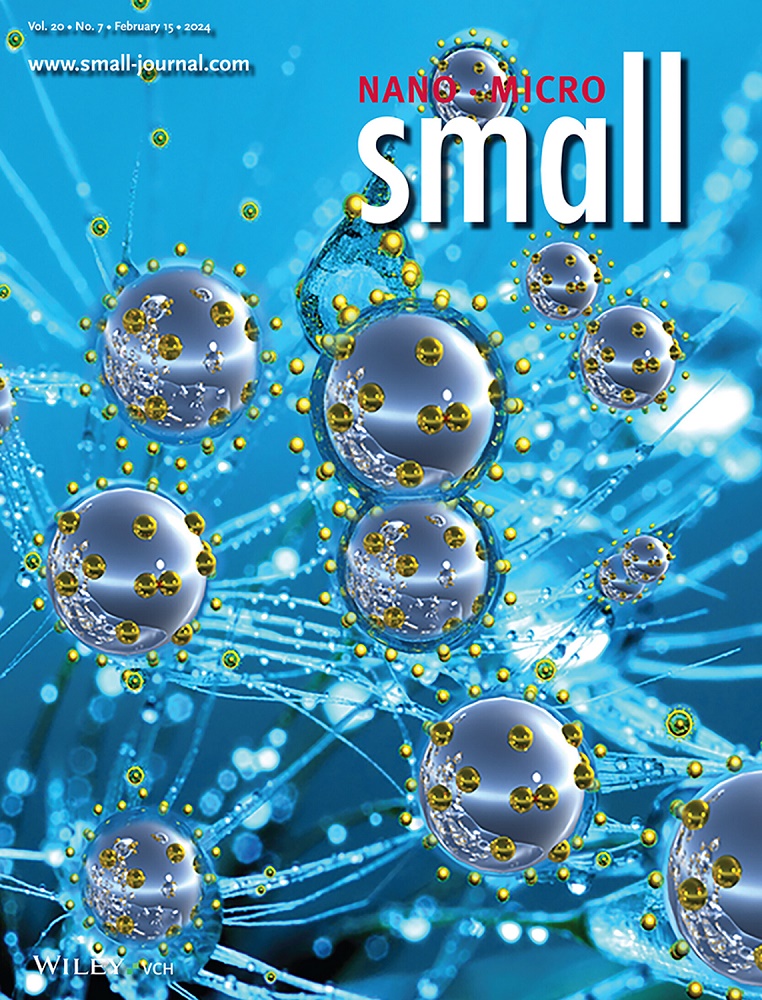Generating Immunological Memory Against Cancer by Camouflaging Gold‐Based Photothermal Nanoparticles in NIR‐II Biowindow for Mimicking T‐Cells
IF 13
2区 材料科学
Q1 CHEMISTRY, MULTIDISCIPLINARY
引用次数: 0
Abstract
Photothermal therapy (PTT) against cancer not only directly ablates tumors but also induces tumor immunogenic cell death (ICD). However, the antitumor immune response elicited by ICD is insufficient to prevent relapse and metastasis because of the immunosuppressive tumor microenvironment (TME). A biomimetic nanoplatform (bmNP) mimicking cytotoxic lymphocytes (CTLs) for combinational photothermal‐immunotherapy to effectively regulate the immunosuppressive TME is reported here. The bmNP is constructed by wrapping the通过在近红外-II 生物窗口中伪装金基光热纳米粒子以模拟 T 细胞,生成抗癌免疫记忆
针对癌症的光热疗法(PTT)不仅能直接消融肿瘤,还能诱导肿瘤免疫原性细胞死亡(ICD)。然而,由于肿瘤微环境(TME)具有免疫抑制作用,ICD 引发的抗肿瘤免疫反应不足以防止复发和转移。本文报告了一种模拟细胞毒性淋巴细胞(CTLs)的生物仿生纳米平台(bmNP),用于联合光热免疫疗法,以有效调节免疫抑制性肿瘤微环境。bmNP 是通过将 T 细胞膜包裹在一种新型光热制剂--球形金基 PNCs(sAuPNCs)上而构建的。与 T 细胞类似,bmNP 通过 T 细胞膜上的粘附蛋白靶向肿瘤,从而增强了在肿瘤部位的蓄积。所获得的sAuPNCs在第二近红外(NIR-II)区具有宽吸收带,光热转换效率(PCE)高达约75%,并且具有良好的光稳定性。尺寸较小的 bmNP 更能与 T 细胞竞争,通过 PD-1/PD-L1 相互作用与肿瘤细胞结合,从而有效阻断 T 细胞的 PD-1 检查点,防止 T 细胞衰竭。此外,体内研究显示,接受 bmNPs 治疗的小鼠可显著激发免疫记忆效应。总之,bmNPs 在光热增强免疫疗法中显示出巨大的潜力。
本文章由计算机程序翻译,如有差异,请以英文原文为准。
求助全文
约1分钟内获得全文
求助全文
来源期刊

Small
工程技术-材料科学:综合
CiteScore
17.70
自引率
3.80%
发文量
1830
审稿时长
2.1 months
期刊介绍:
Small serves as an exceptional platform for both experimental and theoretical studies in fundamental and applied interdisciplinary research at the nano- and microscale. The journal offers a compelling mix of peer-reviewed Research Articles, Reviews, Perspectives, and Comments.
With a remarkable 2022 Journal Impact Factor of 13.3 (Journal Citation Reports from Clarivate Analytics, 2023), Small remains among the top multidisciplinary journals, covering a wide range of topics at the interface of materials science, chemistry, physics, engineering, medicine, and biology.
Small's readership includes biochemists, biologists, biomedical scientists, chemists, engineers, information technologists, materials scientists, physicists, and theoreticians alike.
 求助内容:
求助内容: 应助结果提醒方式:
应助结果提醒方式:


